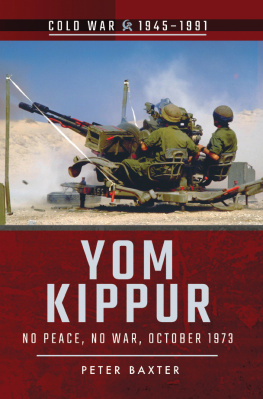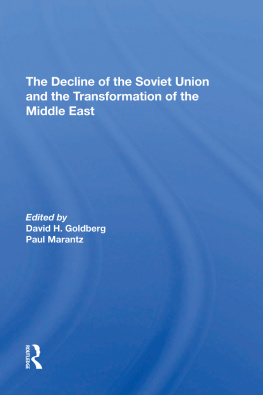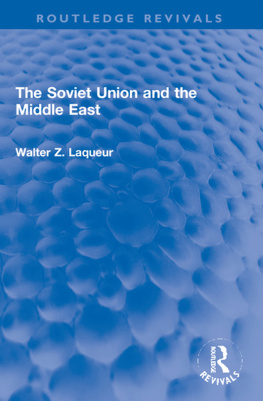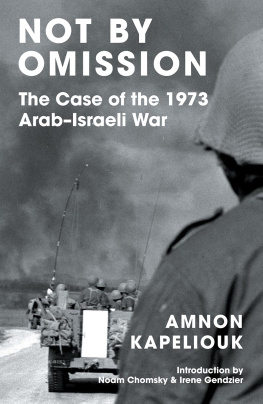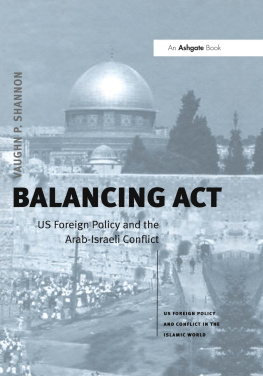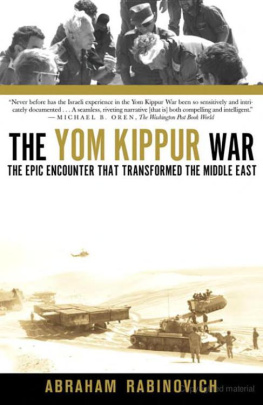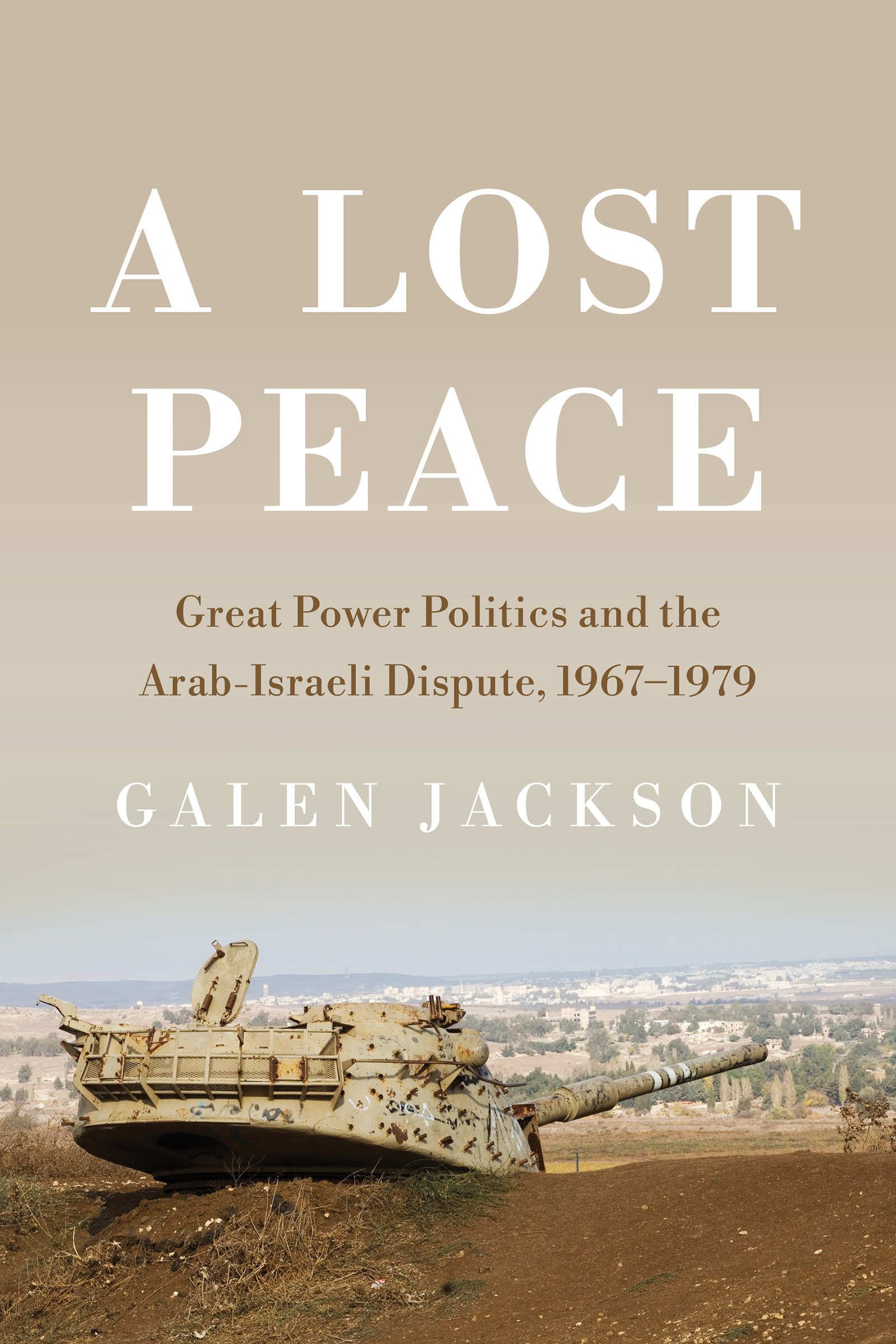Contents
Guide
Pagebreaks of the print version
A Lost Peace
Great Power Politics and the Arab-Israeli Dispute, 19671979
GALEN JACKSON
Cornell University Press
Ithaca and London
For Mom and Dad
Contents
Acknowledgments
The road to this books completion has been long. It has very much been a road worth taking, but the journey was by no means always easy, and I would not have been able to finish it without the enormous help of a number of organizations and amazing people. With that in mind, I hope that you, as the reader, will indulge me as I take some time to thank them.
For starters, I am indebted to a number of institutions that have generously supported my research over the years. While at the University of California, Los Angeles, I was fortunate to receive fellowships and grants from UCLA, the Bradley Foundation, the University of Californias Institute for Global Conflict and Cooperation, the Gerald R. Ford Presidential Foundation, and the Lyndon B. Johnson Presidential Foundation. The Stanton Foundation awarded me a Nuclear Security Predoctoral Fellowship, which allowed me to spend a year doing research in the Security Studies Program at MIT. Both the Stanley Kaplan Program in American Foreign Policy and the Clements Center for National Security gave me year-long postdoctoral fellowships, which enabled me to continue my work at Williams College and at the University of Texas at Austin, respectively. My appreciation for what these programs and institutions have done for me is enormous.
I am also grateful to have had the opportunity to build on my earlier research in this book. Portions of chapter 1 were previously published in my article The Johnson Administration and Arab-Israeli Peacemaking after June 1967, Middle East Journal 74, no. 2 (Summer 2020): 20219. Parts of chapters 2 and 4 draw upon A Self-Inflicted Wound? Henry Kissinger and the Ending of the October 1973 Arab-Israeli War, Diplomacy & Statecraft 32, no. 3 (September 2021): 55478, which I co-authored with Marc Trachtenberg. Sections of chapters 4 and 5 draw upon my article The Showdown That Wasnt: U.S.-Israeli Relations and American Domestic Politics, 197375, International Security 39, no. 4 (Spring 2015): 13069. Portions of chapter 6 draw upon my article, Strategy and Two-Level Games: U.S. Domestic Politics and the Road to a Separate Peace, 19771978, Journal of Cold War Studies 19, no. 3 (Summer 2017): 16095. The books general argument draws partially upon my article Who Killed Dtente? The Superpowers and the Cold War in the Middle East, 196977, International Security 44, no. 3 (Winter 2019/20): 12962, as well as upon my chapter American Policy in the Middle East during the Cold War: Interests, Constraints, and Decision-Making, in The Routledge History of U.S. Foreign Relations, ed. Tyson Reeder (New York: Routledge, 2021), 35768.
The experience I have had working with the team at Cornell University Press has been nothing short of fantastic. I appreciate all of the work that Clare Jones put into getting the manuscript ready for production. For his part, Michael McGandy guided me through the process of getting the manuscript into publishable condition every step of the way. I was also fortunate to receive helpful feedback from an anonymous reviewer, for which I am grateful. Moreover, Stephen Walt gave me useful and detailed comments on the manuscript, from which I benefitted tremendously. The final manuscript was made much stronger by the constructive criticisms that he provided. In short, I feel fortunate that I was given a chance to work with the team at Cornell University Press. I would also like to thank Irina Burns for editing the manuscript and Mary Ribesky of Westchester Publisher Services for shepherding the project through production.
I have also had the good fortune of being able to work with some incredibly intelligent and generous individuals throughout the process of writing this book. My interest in the Middle East stems largely from the mentorship of Magns Bernhardsson at Williams College. At the University of Chicago, I not only had the opportunity to take courses with giants in the field, such as John Mearsheimer, but also to work closely with Michael Reese, who spent countless hours giving me advice. I consider myself lucky to have had those experiences. I am also grateful to all of the people who helped me while at UCLA, and especially to Art Stein, Debbie Larson, Steven Spiegel, and Rob Trager. Likewise, I am grateful to Barry Posen, Owen Cote, and Vipin Narang for giving me the opportunity to spend a year at MIT and for welcoming me so warmly to the Security Studies Program. I owe Frank Gavinwho has helped me since the day I met hima special debt for his support, both during and after the year I was at MIT. I have nothing but fond memories of my time at the Clements Center at UT-Austin, and I thank Will Inboden for both giving me the chance to work there and for all the help he has given me over the years. I also want to thank Leopoldo Nuti for all of his advice and support. Last but not least, William Quandt has been incredibly generous with his time whenever I have reached out to him with substantive questions relating to this book, something that I deeply appreciate.
I finished this book after coming back to Williams, this time as a professor in the political science department. It has been a special experience to become a colleague and friend of individuals who were previously my teachers. I am extremely grateful to Sam Crane, Justin Crowe, Laura Ephraim, Cathy Johnson, Michael MacDonald, Jim Mahon, Nicole Mellow, Ngoni Munemo, Nimu Njoya, Darel Paul, Mark Reinhardt, Sid Rothstein, Cheryl Shanks, Matt Tokeshi, and Mason Williams for being such wonderful colleagues and for making the department such a great place to work. I thank the departments administrative assistant, Sarah Campbell-Copp, for all the help she has given me since I began working at Williams.
One of the most special parts of this journey has been the friendships that I have formed. At UCLA, I made an incredible group of friends that included Jesse Acevedo, Soumi Chatterjee, Paasha Mahdavi, Steve Palley, and Ryan Weldzius. That on its own made my time there well spent. At MIT, I learned an enormous amount from spending time every day with Brendan Rittenhouse Green and Rohan Mukherjee, both of whom have given me valuable comments on my work over the years. At UT-Austin, I had the good fortune of getting the chance to share an office with Evan McCormick, one of the nicest people I have ever met.
There are two people in particular whom I have been lucky to have as mentors and whose influence on me has been substantial. The first is James McAllister, whose class on the Vietnam War first made me think about pursuing a career in political science and focusing specifically on international security issues. He has been a major supporter of mine since that time, and I do not think there is any way that I can possibly repay the debt that I owe him for all of the help he has given me. It is my great fortune that I now get to work alongside him as a colleague. One of the absolute highlights of my professional career was getting to teach a course with him on US foreign policy after having been his student and having learned so much from him over the years.
The second person to whom I owe so much is Marc Trachtenberg. When I think about the best choices I have made, deciding to study at UCLA is high on the list because it gave me the opportunity to work with Marc. There is no way to describe the impact that he has had on me as both a scholar and a person, so I am not even going to try. Whenever I think about the sacrifices and challenges that were involved in going down this career path, I know that it was all worth it because of what I have gotten to learn from Marc. In addition to the unending support he has given me in my scholarly endeavorsI am somewhat embarrassed by the number of hours Marc has spent giving me comments on my workI have been nothing short of astounded by his mentorship. What is more, at no point has Marc ever expected a thank you. As he likes to say, How can you expect to be thanked for something that you love doing? With that in mind, what I miss most about UCLA is being able to drop by Marcs office and talk with him for hours on end. It is perhaps unsurprising, then, that getting to work with students is now my favorite part of my job. For that, Marc deserves an enormous amount of credit. If I can do half as good a job as a mentor to my students as he did with me, I think I will have made a difference.


